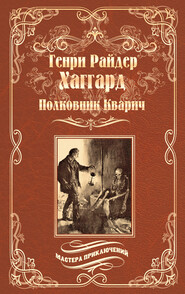По всем вопросам обращайтесь на: info@litportal.ru
(©) 2003-2024.
✖
Dr. Therne
Настройки чтения
Размер шрифта
Высота строк
Поля
One afternoon when I was sitting alone in the smoking-room, Major Selby came in and limped to an armchair.
“Hullo, Major, have you got the gout again?” I asked jocosely.
“No, doctor; at least that pompous old beggar, Bell, says I haven’t. My leg has been so confoundedly painful and stiff for the last few days that I went to see him this morning, but he told me that it was only a touch of rheumatism, and gave me some stuff to rub it with.”
“Oh, and did he look at your leg?”
“Not he. He says that he can tell what my ailments are with the width of the street between us.”
“Indeed,” I said, and some other men coming in the matter dropped.
Four days later I was in the club at the same hour, and again Major Selby entered. This time he walked with considerable difficulty, and I noticed an expression of pain and malaise upon his rubicund countenance. He ordered a whisky and soda from the servant, and then sat down near me.
“Rheumatism no better, Major?” I asked.
“No, I went to see old Bell about it again yesterday, but he pooh-poohs it and tells me to go on rubbing in the liniment and get the footman to help when I am tired. Well, I obeyed orders, but it hasn’t done me much good, and how the deuce rheumatism can give a fellow a bruise on the leg, I don’t know.”
“A bruise on the leg?” I said astonished.
“Yes, a bruise on the leg, and, if you don’t believe me, look here,” and, dragging up his trouser, he showed me below the knee a large inflamed patch of a dusky hue, in the centre of which one of the veins could be felt to be hard and swollen.
“Has Sir John Bell seen that?” I asked.
“Not he. I wanted him to look at it, but he was in a hurry, and said I was just like an old woman with a sore on show, so I gave it up.”
“Well, if I were you, I’d go home and insist upon his coming to look at it.”
“What do you mean, doctor?” he asked growing alarmed at my manner.
“Oh, it is a nasty place, that is all; and I think that when Sir John has seen it, he will tell you to keep quiet for a few days.”
Major Selby muttered something uncomplimentary about Sir John, and then asked me if I would come home with him.
“I can’t do that as a matter of medical etiquette, but I’ll see you into a cab. No, I don’t think I should drink that whisky if I were you, you want to keep yourself cool and quiet.”
So Major Selby departed in his cab and I went home, and, having nothing better to do, turned up my notes on various cases of venous thrombosis, or blood-clot in the veins, which I had treated at one time or another.
While I was still reading them there came a violent ring at the bell, followed by the appearance of a very agitated footman, who gasped out: -
“Please, sir, come to my master, Major Selby, he has been taken ill.”
“I can’t, my good man,” I answered, “Sir John Bell is his doctor.”
“I have been to Sir John’s, sir, but he has gone away for two days to attend a patient in the country, and the Major told me to come for you.”
Then I hesitated no longer. As we hurried to the house, which was close at hand, the footman told me that the Major on reaching home took a cup of tea and sent for a cab to take him to Sir John Bell. As he was in the act of getting into the cab, suddenly he fell backwards and was picked up panting for breath, and carried into the dining-room. By this time we had reached the house, of which the door was opened as we approached it by Mrs. Selby herself, who seemed in great distress.
“Don’t talk now, but take me to your husband,” I said, and was led into the dining-room, where the unfortunate man lay groaning on the sofa.
“Glad you’ve come,” he gasped. “I believe that fool, Bell, has done for me.”
Asking those present in the room, a brother and a grown-up son of the patient, to stand back, I made a rapid examination; then I wrote a prescription and sent it round to the chemist – it contained ammonia, I remember – and ordered hot fomentations to be placed upon the leg. While these matters were being attended to I went with the relations into another room.
“What is the matter with him, doctor?” asked Mrs. Selby.
“It is, I think, a case of what is called blood-clot, which has formed in the veins of the leg,” I answered. “Part of this clot has been detached by exertion, or possibly by rubbing, and, travelling upwards, has become impacted in one of the pulmonary arteries.”
“Is it serious?” asked the poor wife.
“Of course we must hope for the best,” I said; “but it is my duty to tell you that I do not myself think Major Selby will recover; how long he will last depends upon the size of the clot which has got into the artery.”
“Oh, this is ridiculous,” broke in Mr. Selby. “My brother has been under the care of Sir John Bell, the ablest doctor in Dunchester, who told him several times that he was suffering from nothing but rheumatism, and now this gentleman starts a totally different theory, which, if it were true, would prove Sir John to be a most careless and incompetent person.”
“I am very sorry,” I answered; “I can only hope that Sir John is right and I am wrong. So that there may be no subsequent doubt as to what I have said, with your leave I will write down my diagnosis and give it to you.”
When this was done I returned to the patient, and Mr. Selby, taking my diagnosis, telegraphed the substance of it to Sir John Bell for his opinion. In due course the answer arrived from Sir John, regretting that there was no train by which he could reach Dunchester that night, giving the name of another doctor who was to be called in, and adding, incautiously enough, “Dr. Therne’s diagnosis is purely theoretical and such as might be expected from an inexperienced man.”
Meanwhile the unfortunate Major was dying. He remained conscious to the last, and, in spite of everything that I could do, suffered great pain. Amongst other things he gave an order that a post-mortem examination should be made to ascertain the cause of his death.
When Mr. Selby had read the telegram from Sir John he handed it to me, saying, “It is only fair that you should see this.”
I read it, and, having asked for and obtained a copy, awaited the arrival of the other doctor before taking my departure. When at length he came Major Selby was dead.
Two days later the post-mortem was held. There were present at it Sir John Bell, myself, and the third medico, Dr. Jeffries. It is unnecessary to go into details, but in the issue I was proved to be absolutely right. Had Sir John taken the most ordinary care and precaution his patient need not have died – indeed, his death was caused by the treatment. The rubbing of the leg detached a portion of the clot, that might easily have been dissolved by rest and local applications. As it was, it went to his lung, and he died.
When he saw how things were going, Sir John tried to minimise matters, but, unfortunately for him, I had my written diagnosis and a copy of his telegram, documents from which he could not escape. Nor could he deny the results of the post-mortem, which took place in the presence and with the assistance of the third practitioner, a sound and independent, though not a very successful, man.
When everything was over there was something of a scene. Sir John asserted that my conduct had been impertinent and unprofessional. I replied that I had only done my duty and appealed to Dr. Jeffries, who remarked drily that we had to deal not with opinions and theories but with facts and that the facts seemed to bear me out. On learning the truth, the relatives, who until now had been against me, turned upon Sir John and reproached him in strong terms, after which they went away leaving us face to face. There was an awkward silence, which I broke by saying that I was sorry to have been the unwilling cause of this unpleasantness.
Вы ознакомились с фрагментом книги.
Приобретайте полный текст книги у нашего партнера:
Приобретайте полный текст книги у нашего партнера:

















